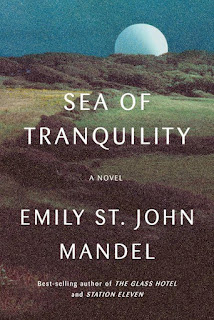Sea of Tranquility is the third novel in the Station Eleven-The Glass House universe. I hesitate to say "trilogy," because god-willing, there'll be more. And besides, the stories themselves are only tangentially connected. That's to say, you don't need to have read the other two to enjoy Sea of Tranquility (though of course having done so will provide some important context and enrich your reading experience. This fantastic New Yorker piece profiling St. John Mandel tells you all you need to know about how the three novels are related).
Of the three, Sea of Tranquility is the most straight-up speculative fiction: The thrust of the plot of the novel is a character traveling back in time to try to figure whether there's a "glitch in the matrix." So the main question the novel asks is this: Are we living in a simulation? And if so, what would cause several different characters over the course of several centuries to experience the same anomalous event?
Structure-wise, Mandel is up to her usual tricks — she jumps all over the place in time and geography to follow the stories of several fascinating characters: A British fellow traveling to Canada, an author (who very much resembles the author of this book) of a pandemic novel on a book tour, a NYC woman who had been friends with Vincent (from The Glass Hotel), and a down-on-his-luck time traveler who lives on the moon. But as always, despite the leaps, it's not hard to follow. This won't be the only time you'll hear this comparison, but there's definitely a Cloud Atlas vibe to this novel.
Mandel uses all these literary fireworks as her vehicle to ask a very simple question with a very difficult answer: What is real? If we're living in simulation, do we need the so-called red pill to awaken to what's real, or, does it matter — as a character comments, "a life lived in a simulation is still a life."
I loved this book. Emily St. John Mandel's superpower is packing an enormous amount of plot and theme into a paucity of pages. Though this has all the elements of the best science fiction, you won't confuse this with Neal Stephenson or Philip K. Dick. St. John Mandel is a much more nimble, much less verbose writer. And her novels are the better for it. This is easily a favorite of the year so far.


No comments:
Post a Comment